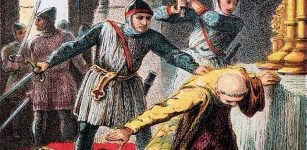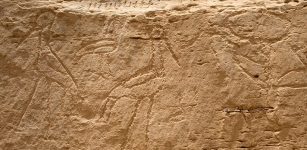Descent Of Orpheus To Underworld Ruled By Hades
A. Sutherland - AncientPages.com - The myth of Orpheus is an attempt to bring the dead to the living world. The death, and its inevitable coming have always caused fear but through the ages people have successfully managed to reduce this negative feeling.
Orpheus was a son of the Thracian river god Oiagros and the Muse Calliope. He was born in a cave not far from Mount Olympus. He was a legendary Thracian musician, poet, and prophet in ancient Greek religion and myth. He sang and played on the lyre so beautifully that everything that lived was gathered around him to listen to his songs and playing.
Mentioned in many Greek stories, he is particularly well-remembered as the harpist and companion of Jason and the Argonauts, who went on an expedition to find for the Golden Fleece.
His rhythmic music made their sailing easier and saved the Argonauts, when they approached the island of the Sirens, sea-nymphs who were endowed with such wonderful voices, that their sweet songs are said to have lured sailors to destruction.
Orpheus was one of the few Greek heroes, who visited the Underworld and successfully returned.
See also:
Goddesses Of Fate And Destiny In Greek, Roman And Slavic Mythology
Goddess Artemis – One Of The Most Respected Olympians
Not many people managed to visit the domain of Hades, but Orpheus was one of them who defeated death, descended to the underground kingdom and left it alive.
Probably the most famous Orpheus myth is the one describing him and his lovely bride Eurydice ("she whose justice extends widely"). They had not been long married when she stepped on a poisonous snake, whose venom killed her. Determined to have her brought back to life, Orpheus traveled to the underworld carrying only his lyre; he hoped to plead with Hades for Eurydice ’release.
He met Hades and explained that he was determined not to leave the land of the dead without his beloved wife. He sang for him beautiful songs, which once again did not lose their power. Surprisingly, Hades agreed to release Eurydice on one condition that he should walk in front of her and not look back until they both had left the underworld.
They followed the dark path and Orpheus guided his wife by striking notes on his lyre but suddenly at last moment of their journey, he suddenly turned to look at her and she vanished from his sight forever. It was the first and Orpheus was not allowed into the underworld anymore.
Angry and distraught at the loss, he returned to Thrace where he came in conflict with the Maenads, female followers of Dionysus, the god of the grape harvest, winemaking and wine.
In one of their bizarre orgies, the Maenads attacked Orpheus and tore him to pieces and then threw his head into the river Hebrus.
His head and lyre were floating on the water and amazingly, sad songs were heard all the way to the Mediterranean Sea. Then they reached the island of Lesbos, where the inhabitants finally buried his head and a shrine was built in Orpheus’ honor near Antissa. All who visited the cave could consult his oracle, until it was ceased by Apollo.
His magical lyre was carried to heaven and placed among the stars by the Muses, who also gathered up the pieces of his body and buried them at Leibethra near Mount Olympus: his grave was always accompanied by the nightingales singing their eternal song.
Orpheus’ soul returned to the underworld and, thus, he could reunite with his wife Eurydice, forever.
Written by – A. Sutherland - AncientPages.com Senior Staff Writer
Copyright © AncientPages.com All rights reserved. This material may not be published, broadcast, rewritten or redistributed in whole or part without the express written permission of AncientPages.com
Expand for references
More From Ancient Pages
-
 Cnut The Great – England’s Danish King And Ruler Of One Of The Largest Nordic Empires
Featured Stories | Jun 15, 2020
Cnut The Great – England’s Danish King And Ruler Of One Of The Largest Nordic Empires
Featured Stories | Jun 15, 2020 -
 Headteacher’s Sarcophagus Unearthed In Ancient City Of Aigai, Turkey
Archaeology | Jan 25, 2017
Headteacher’s Sarcophagus Unearthed In Ancient City Of Aigai, Turkey
Archaeology | Jan 25, 2017 -
 Daily Life Of Ancient Maya
Ancient History Facts | Oct 12, 2020
Daily Life Of Ancient Maya
Ancient History Facts | Oct 12, 2020 -
 Murder Of Archbishop Thomas Becket: One Of Most Famous Crimes Of Middle Ages
Featured Stories | Jan 6, 2017
Murder Of Archbishop Thomas Becket: One Of Most Famous Crimes Of Middle Ages
Featured Stories | Jan 6, 2017 -
 World’s Oldest Shoes: Some Look Surprisingly Modern
Artifacts | Jun 22, 2023
World’s Oldest Shoes: Some Look Surprisingly Modern
Artifacts | Jun 22, 2023 -
 On This Day In History: First Battle Of Reading Took Place – On Jan 4, 871 AD
News | Jan 4, 2017
On This Day In History: First Battle Of Reading Took Place – On Jan 4, 871 AD
News | Jan 4, 2017 -
 Mystery Of The Brave Viking Chief Buried On The Gokstad Ship
Featured Stories | Mar 14, 2016
Mystery Of The Brave Viking Chief Buried On The Gokstad Ship
Featured Stories | Mar 14, 2016 -
 Queen Marie Antoinette’s Silk Shoe Auctioned In Versailles
Artifacts | Nov 17, 2020
Queen Marie Antoinette’s Silk Shoe Auctioned In Versailles
Artifacts | Nov 17, 2020 -
 Mahabalipuram: Ancient Ruined City And Its Marvellous Rock-Cut Architecture In South India
Featured Stories | Jul 25, 2021
Mahabalipuram: Ancient Ruined City And Its Marvellous Rock-Cut Architecture In South India
Featured Stories | Jul 25, 2021 -
 Enchanted Ancient Egyptian Amulet Seal Discovered In Türkiye’s Amasra
Archaeology | Nov 15, 2022
Enchanted Ancient Egyptian Amulet Seal Discovered In Türkiye’s Amasra
Archaeology | Nov 15, 2022 -
 Unexplained Accounts Of Mysterious Fires – No Traces But It Happened – Part 2
Featured Stories | Aug 6, 2019
Unexplained Accounts Of Mysterious Fires – No Traces But It Happened – Part 2
Featured Stories | Aug 6, 2019 -
 On This Day In History: Copernicus’ s Book Banned By Catholic Church – On Mar 5, 1616
News | Mar 5, 2017
On This Day In History: Copernicus’ s Book Banned By Catholic Church – On Mar 5, 1616
News | Mar 5, 2017 -
 Unknown Rock Inscriptions And Earliest Monumental Hieroglyphs In Egypt Shed New Light On Ancient Writing
Archaeology | Jun 27, 2017
Unknown Rock Inscriptions And Earliest Monumental Hieroglyphs In Egypt Shed New Light On Ancient Writing
Archaeology | Jun 27, 2017 -
 Ancient Native Americans’ Encounter With The Star People – An Otherworldly Rescue?
Featured Stories | Jul 20, 2021
Ancient Native Americans’ Encounter With The Star People – An Otherworldly Rescue?
Featured Stories | Jul 20, 2021 -
 Ancient Urartu Settlement, Water Tunnel And Rock Tombs Found In Erzurum, Eastern Turkey
Archaeology | Dec 19, 2017
Ancient Urartu Settlement, Water Tunnel And Rock Tombs Found In Erzurum, Eastern Turkey
Archaeology | Dec 19, 2017 -
 Look Inside A Restored Pompeii House – A Unique Glimpse Into Life In Italy’s Ancient City
Archaeology | Jan 11, 2023
Look Inside A Restored Pompeii House – A Unique Glimpse Into Life In Italy’s Ancient City
Archaeology | Jan 11, 2023 -
 3D-printed replica of an artefact revives music of Iron-Age Ireland
News | Sep 4, 2015
3D-printed replica of an artefact revives music of Iron-Age Ireland
News | Sep 4, 2015 -
 Mysterious Lost Tartessian Civilization And Its Ancient Tablet With Paleo-Hispanic Alphabet
Archaeology | Jun 15, 2024
Mysterious Lost Tartessian Civilization And Its Ancient Tablet With Paleo-Hispanic Alphabet
Archaeology | Jun 15, 2024 -
 On This Day In History: The Gregorian Calendar Implemented – On Oct 5, 1582
News | Oct 5, 2016
On This Day In History: The Gregorian Calendar Implemented – On Oct 5, 1582
News | Oct 5, 2016 -
 Giulia Tofana Poisoned 600 Men – Beautiful Sicilian Woman And Her Deadly Mission
Featured Stories | Feb 22, 2018
Giulia Tofana Poisoned 600 Men – Beautiful Sicilian Woman And Her Deadly Mission
Featured Stories | Feb 22, 2018


